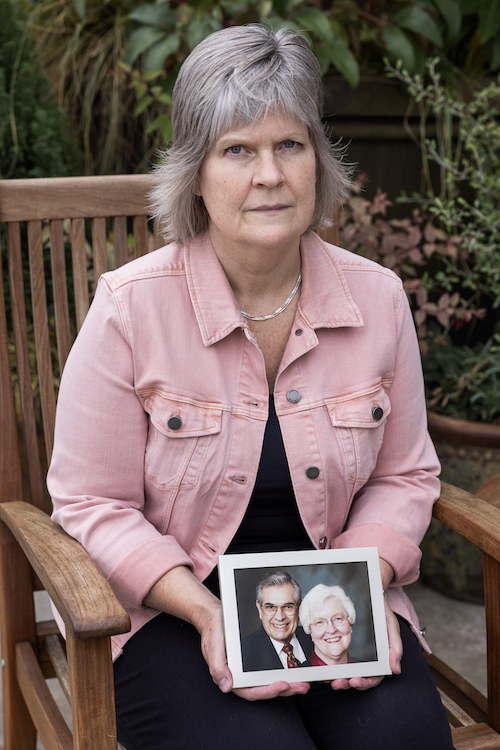
Sounding the Alarm

Photo: Kristina Barker
Biology alumni sees to save lives by raising awareness of carbon monoxide poisoning
by Claire Prasad (Honors '18)
It was April 16, 2013, when Daryl and Shirley Jenkins lost their lives in a hotel room in Boone, North Carolina. Seven weeks later, an 11-year-old boy named Jeffrey Williams died in the same hotel room; and his mother, Jeannie Williams, was left with permanent physical and brain injuries. It was only after Jeffrey Williams’s death that an investigation took place. The cause of death in all three cases? Carbon monoxide (CO) poisoning. The hotel had no CO detection installed and no CO alarm in the room, both of which could have easily prevented the tragedies. Without an alarm, the Jenkins and the Williams families had no way of knowing about the deadly level of CO in the room.
“CO gas is undetectable to human senses. It’s invisible, odorless, and tasteless. It’s impossible to detect if you don’t have a CO-detection device,” says Kris (Jenkins) Hauschildt (’87), the daughter of Daryl and Shirley Jenkins.
After discovering the cause of her parents’ death, Kris says she had to do something—that she couldn’t walk away knowing there were people like her parents who were unaware of the danger they were in.
In 2018 Kris created The Jenkins Foundation with the goals of raising awareness of the dangers of CO poisoning and preventing tragedies like the one that took her parents’ lives.
“My parents are proof that CO poisoning can happen to anyone,” Kris says. “My mother worked at a natural gas company. She certainly was well versed in CO as a danger but had no idea about the lack of regulation involving protection, especially for commercial buildings like hotels.”
Kris discovered that no federal agency tracks CO incidents in hotels. This made it difficult to determine how frequently these poisonings were occurring. Kris decided to take matters into her own hands by researching and documenting CO-poisoning incidents in hotels in the United States.
“I was told that what happened to my parents was rare, and that there weren’t regulations requiring CO detectors in hotel rooms because these incidents hardly ever happened,” Kris says. “I started putting together my own spreadsheet of CO-poisoning incidents in hotels, and I found that there were a lot more exposures happening than what we were led to believe.”
The spreadsheet, which lists incidents dating back to 1967, is maintained and consistently updated on The Jenkins Foundation website. It is the first archive of its kind.
Kris’s efforts have not gone unnoticed. CO researchers have published articles in medical journals using data from The Jenkins Foundation spreadsheet, tracking deaths and injuries over decades and comparing incidents to US fire service reports.
Using the published CO research and a growing archive of incidents similar to the one that took her parents’ lives, Kris turned towards proposing updates to national fire and life safety codes to better protect occupants of commercial buildings, including hotels.
One code organization, the National Fire Protection Association (NFPA), had requirements in place for newly constructed hotels to install CO detection since 2012, but no such requirements for existing hotels. Sharing her story and data in front of the NFPA code committee, Kris proposed a matching requirement for existing hotels. Her proposal was approved, and the code was updated in 2021 to include existing hotels.
Similarly, Kris successfully advocated for a change in the International Fire Code (IFC). The IFC formerly had CO-detection requirements only for certain occupancy-type buildings, but beginning in 2024, it will require CO detection in all new and existing occupancy-type buildings.
While Kris is encouraged that both code organizations have updated their requirements, it remains up to individual states and countries to adopt and enforce these requirements.
“The fact that these codes passed shows that there is support for having these requirements in place,” Kris says. “Hopefully, this will start a trend towards further improving and enacting them in all states.”
In the absence of universal regulation of CO detection, Kris says that personal detection is the best way for individuals to protect themselves against CO poisoning in their homes and while traveling.
In conjunction with National Fire Prevention Week every October, The Jenkins Foundation partners with local fire departments in Kris’s home state of Washington to distribute free CO alarms to families. This initiative has been hugely successful in raising awareness of the dangers of CO and the lifesaving value of CO alarms.
The Jenkins Foundation has made significant progress in raising awareness and increasing CO safety, but Kris isn’t stopping yet.
“This has not been a straightforward process, but it certainly has been rewarding,” Kris says. “We’ve made some headway in the system and have gotten changes in place to better protect people in the future. However, deaths and injuries due to CO continue to occur with alarming regularity in this country, so there’s still much to be done.”
Learn more: TheJenkinsFoundation.com
About the Westminster Review
The Westminster Review is Westminster University’s bi-annual alumni magazine that is distributed to alumni and community members. Each issue aims to keep alumni updated on campus current events and highlights the accomplishments of current students, professors, and Westminster alum.
GET THE REVIEW IN PRINT Share Your Story Idea READ MORE WESTMINSTER STORIES